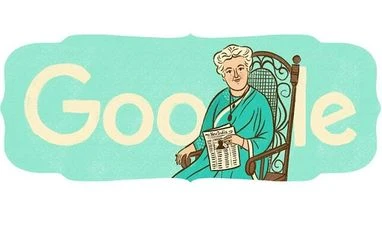Remembering the life and times of Annie Besant
A staunch critic of British rule, as well as the Church, Besant was the first woman chairperson of Indian National Congress
)
Irish-born freedom fighter Annie Besant remains a key figure in history as a friend of India. A staunch critic of British rule, as well as the Church, Besant was the first woman chairperson of Indian National Congress. On Thursday, search engine giant Google paid rich tributes to the freedom fighter on her 168th birthday, with its doodle showing a grey-haired Besant wearing a soft smile and holding a copy of the New India newspaper.
Besant had in 1893 come to India, where she influenced millions of life with her speeches, the works she did for Home Rule, the Indian National Congress and The Theosophical Society. She entered the arena of India’s freedom struggle in 1913 and, along with Bal Gangadhar Tilak, started All India Home Rule League three years later.
In 1918, she declared in her paper New India: “I love the Indian people as I love none other, and... my heart and my mind... have long been laid on the altar of the Motherland.”
She also started Young Men’s Indian Association to teach and inspire people for public work and the daily newspaper New India, which became the main instrument for her and fellow Congress members to promote Home Rule. After she became she was elected the president of the Indian National Congress in 1917, Mahatma Gandhi once said she had awakened India from a deep slumber.
Her contribution to Indian society does not end with her works at the Congress. In 1898, she had founded the Central Hindu School and College in Varanasi, then Benares. Later, she had also started the Central Hindu School for Girls. In 1918, when Baden-Powell declared India unfit to be a scout, she started the Indian Scout movement. Besant in 1932 received the highest scout medal, the ‘silver wolf’ model, from Powel.
Also Read
Besant’s life, both public and personal, had started in England. She was born in 1October 1847, a hundred years before India’s independence. A devout Christian, she was married to an English clergyman, Rev Frank Besant, when she was 20.
In 1872, she left the church, questioning the Christian traditions and the control Church had on the British people, which led to her legal separation with Rev Besant. Due to her “controversial” views in a highly Christian patriarchal society, Rev Besant got the sole custody of their children. She was known for her socialist ideologies and her works for women rights. But later, she denounced her socialist ideologies, too.
Besant’s interest in theosophy grew by 1890s and she subsequently travelled to India to be a member of Theosophical society. In 1907, she became the second International President of the Theosophical Society and remained in that position until her death in 1933.
More From This Section
Don't miss the most important news and views of the day. Get them on our Telegram channel
First Published: Oct 01 2015 | 5:18 PM IST
